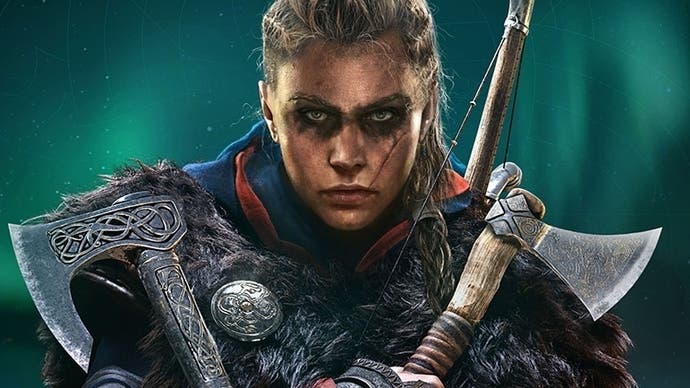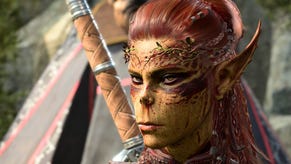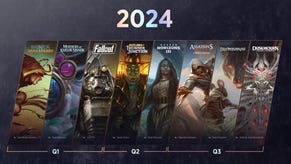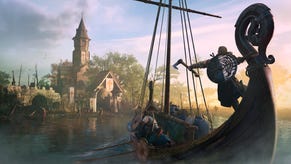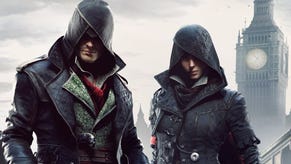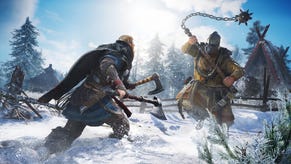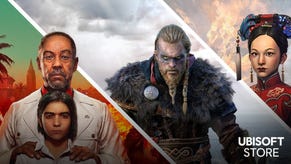Assassin's Creed Valhalla review - a saga for the ages
Worthy of passing to the next generation.
There's a Viking belief that the paths we walk are predetermined, and that the threads of our lives are already woven like strands in a collective tapestry. Where your own thread encounters others, even where it ends, are points in history already sewn together by the Fates. But the Vikings also believed in an idea of free will, in the possibility to see the path prophecy might have chosen and the ability to resist it, to fight for your own destiny and the destinies of those whose lives you might touch. Such ideas run through the brilliant narrative of Assassin's Creed Valhalla and the life of its heroine Eivor, to lift this beautiful game into a saga for the ages.
A Viking-set Assassin's Creed is a perfect setting for a series which has always been obsessed by the ideas of order versus resistance, of Assassins versus Templars (or again here, in this third chapter set in ancient times, the Hidden Ones versus the Order of the Ancients). It's also a perfect setup for whatever kind of Assassin's Creed game you're looking for - one which involves some wonky sci-fi shenanigans and fun mythological elements or simply a 60-hour Viking tale about knocking English heads together.
Valhalla protagonist Eivor is a very likable Viking, a level-headed conqueror suddenly set on a path for England in search of a new home and in support of her clan. There was always going to be a tension between the popular view of Vikings as only raiders and pillagers rather than the settlers they were also - but Eivor's story and search for her own brand of peace smooths away this tension as much as possible. Over the course of her quest around the kingdoms, her task is to unite more than it is to divide - something underpinned by your regular returns to the settlement of Ravensthorpe, a place you'll help grow into a home for a diverse cast of characters. It's not perfect - smashing up monasteries simply to build huts in your hometown and only slaying soldiers, rather than monks, is pure video game logic - but as far as Valhalla's charismatic and wonderfully dry main character is concerned, Eivor does enough to carry the story through.
Much has been made of the option to play Eivor as either male or female - a first for the Assassin's Creed series - and in particular of Valhalla's default choice which has the game pick this for you at specific points. With hindsight, knowing the narrative reason for this and seeing its overall impact on the vast, vast percentage of the experience, this option is actually the one I'd recommend - at least until the game swaps who you're playing as for the first time, or it finally clicks for you as to why it does. Suffice to say this option never impacted my attachment to the Eivor I played as across the majority of the game, and it is not the situation some had expected, where your immersion could be broken by a constant ping-pong back and forth.
Your version of Eivor - their life, their choices and their relationships - is never detracted from, something that had been a valid concern. This option also has wider - and ultimately, I believe, positive - implications in the struggle to see better female representation in the Assassin's Creed series - something pushed for by Ubisoft's own developers as well as fans, especially in a game that is still overwhelmingly being marketed with its male option front and centre.
Eivor's story thread involves a prophecy she will eventually betray Sigurd, her brother and clan leader, something initially as unthinkable to her as the idea their collective glories won't earn them a place side-by-side in Valhalla. Their bond is strong, forged amongst family tragedy and the need to survive in new lands, but slowly the threads binding the siblings begin to fray. There are many hours of story and several key characters that play a part in this, and while it's a tale best left to be unravelled by yourself as much as possible, it's a changing relationship that is well paced. As Eivor, I was the one journeying the land to form alliances and grow our settlement while Sigurd was off messing around with Basim, his new assassin buddy. Whenever Sigurd disappeared off-screen for several hours, I would wonder what he was up to, and when he popped up again, I wouldn't always like what I heard.
Eivor's path towards this reckoning is one she walks alongside the mysterious figure of Odin, someone she has a peculiarly close connection with. The Viking god has a prophecy of his own to struggle with: the legend he will meet his maker on the apocalyptic day of Ragnarok, in the jaws of the giant wolf Fenrir. Ubisoft has already shown glimpses of Valhalla's mythological realms, which Eivor can visit via a dream-like connection, and it's in those you will find out much, much more about Odin's role in the story, the parallels between him and Eivor, and the connection between the two. It's smartly-plotted stuff, couched in just the right way so it never feels too out of place, while acting like a mythological story add-on woven directly into the base game.
For those who enjoyed the more experimental and varied environments found in Odyssey's excellent Atlantis expansion, Asgard and Jotunheim are built in much the same vein. Finally, it's worth mentioning what's going on outside of the Animus, where there's a quick conclusion to the ongoing story of Layla Hassan, the character you played in the modern day sections of the two previous games, Assassin's Creed Origins and Odyssey. It's 2020, the pandemic is real, and on top of that there's another newly-prophesied threat to stop, similar to the impending solar flare back in the series' Desmond era. As ever, the answers lie back in the past and specifically, in Eivor's story.
Can this trio of characters - Eivor, Odin, Layla - unpick the threads of their fates? That is the story Valhalla tells and ultimately answers in a more cohesive way than the splayed story threads of Odyssey's own trio of plotlines (and for those who just want to play the historical stuff, rest assured that remains the overwhelming focus). But while there are similarities to Odyssey in the shape of Valhalla's story, there are some key differences in how it is told. I had expected Valhalla to stick to the formula of Ubisoft Quebec's very popular predecessor, but the Origins team at Ubisoft Montreal has come up with something much closer to its own previous Ancient Egypt-set chapter. Where Odyssey offered branching storytelling and quests with a cascade of narrative outcomes, Valhalla's story is noticeably more linear, with few places to really exert your own decision-making and control. Each of its many map regions holds an arc with several main missions and perhaps a secondary objective, but no side-quests whatsoever. Indeed, in what feels like a regression even from Origins, you'll simply run across fleeting world events, which amount to quick interactions with NPCs.
Valhalla's winnowed quest structure feels like a decision made to provide a more focused tale - one that is never left to wander all over the Mediterranean, but that instead directs you to specific parts of England, one at a time, before reporting back to your settlement for a debrief. Each region you visit feels like a feature-length episode of a good TV show, with guest stars that often recur further down the line. The focused plot twists and heartbreaks in Valhalla's tale often hit emotional highs Odyssey sometimes struggled with amongst the sheer weight of storytelling spread all over its world, while Eivor's journeys further afield to Vinland, Asgard and Jotunheim are well integrated into direction of the main narrative rather than being left for players who still want more after the main quest is done. Still, it's a disappointment that the flourishing RPG-side of Assassin's Creed has been impacted, that Valhalla does not hold much room for meaningful choices, and that the few dialogue options on offer give little more than quickly-forgotten flavour. Eivor is a great and memorable heroine, but one I rarely felt I was forging my own version of, as I had with Odyssey's Kassandra.
One antidote to the lack of side-quests is the impact of your settlement, and the time you'll spend getting to know its growing community. For those who remember Assassin's Creed 3's frontier village, the vibe is very similar - and, ultimately it feels closer to that than the kind of RPG hub where everyone has something new to say every time you visit. Still, every so often, a new quest will pop up involving one of your villagers, and typically these slice of life stories offer an enjoyable palate cleanser from the drama of the main campaign. You'll go hunting or sightseeing, sometimes to be rewarded with an unexpected new ability or item as a result, or other times just to get closer to a character who might otherwise be a vendor. Some of these characters can be romanced (there are a few options for flings outside the village too), and some can become a permanent partner for Eivor. It's a step up from the fleeting romance options introduced in Odyssey, but it still feels mechanical. And while one particular romance option does impact the game's story - one of the few times I felt able to see something of my own version of Eivor play out - this thread still felt abrupt.
Otherwise, your settlement features a bustling population you can mostly ignore, unless you need their services or access to one of the game's various systems they control. There's a blacksmith who can upgrade gear quality, boat workers who can trick out your longship, or hunters who reward you for slaughtering wildlife. Assassin's Creed Origins fans will recognise a familiar face once again providing quests to let you grind out items from the game's paid cosmetic packs. Other characters here have even less to do - the initially interesting Hidden One named Hytham, for example, or Roman fanatic Octavian, both essentially act as places to dump collectables you find when exploring the open world. I love having a settlement with so many familiar faces in it, I just wish there was more for them to do.
Beyond the settlement's walls, England awaits. Valhalla's version is the ultimate Saxon pastoral fantasy, one of roundhouse huts and crumbling Roman ruins set amongst flowering meadows, dry stone walls, forests, fens, and fields. Every surface feels embellished, from the fronds of moss on the stones Eivor climbs, to the cave systems regularly hidden behind towering waterfalls. It is often astonishingly pretty, particularly around golden hour, or as the evening mist sets in, moonlight filtering through trees. I could write pages about how this game replicates the feeling of the English countryside, the flourishes that can be found as you explore, the dirt which gets caked onto Eivor's boots as she stomps through the fields, or the snow kicked onto her clothes while adventuring in colder climes. (And, as a local, the sight of an early Norwich, the inclusion of Seahenge, the legendary Black Shuck and the ability to see seals on the north Norfolk coast felt like East Anglian fan service.)
Between England, Norway, Vinland, Asgard and Jotunheim, Eivor has an astonishing breadth of landscapes to explore, and while size comparisons are always crude, Valhalla's world is one which altogether feels equal to Odyssey's scope. More importantly, perhaps, it is spread out in a way that feels more manageable, more varied, and more enticing. Few story arcs passed by without me getting majorly distracted by several different things along the way, and while location types are not always unique, each generally features a clever bit of puzzling to find hidden loot, or an interesting layout of enemies upon which to test my battle skills.
Early chapters in Valhalla's narrative skew towards a strong Viking flavour - raiding with your longship, castle assaults and the like - that are later balanced to some degree by the game's cities: dense areas that encourage you to spend several hours at a time scurrying around rooftops well away from your Viking crew and longboat. These are, of course, relatively small when compared to the floor space of the city-set games of the past. Still, they will make early Assassin's Creed fans feel very much at home in terms of the gameplay on offer: investigation-style activities, treasure hunts, rooftop assassinations, and even the series' first tailing mission in what feels like years. Vinland, meanwhile, offers the traditional 'let's put the main character somewhere completely different with none of their usual gear' section, while not walling Eivor in there for however long it takes you to complete its arc. Fans of Assassin's Creed 3 are the ones being treated here, with treetop parkour and long sections voiced entirely in Native American language. (Oh, and eight years later, the kayaks which got cut from that game are finally now usable.)
Valhalla slowly builds up Eivor's abilities, though I never got to the point where I felt as powered up as Kassandra in Odyssey (even if the lore nerd in me acknowledges Kassandra was able to wield an essentially-magical artefact to do so). Still, combat feels refined, far more bloody, and meatier overall now with three gauges to keep an eye on (health, stamina for things like dodging, and your special ability bar). Valhalla offers a sprawling skill web, nodes of which you'll unlock at regular XP milestones, in order to access numerous passive abilities. Meanwhile, Books of Knowledge found within the game's world gift specific abilities you can choose eight (four melee, four ranged) to have active at any one time. The best of these are the ones that spice up the variety of options available to Eivor while stuck in the middle of fights, such as the skills to stomp on prone foes, or pick up and throw discarded weapons, as well as the risky but fun super-assassinate move which lets you one-shot foes while undetected if you complete its time-sensitive mini-game. I liked combining this with the thrown axe double assassinate skill to get two super-assassinations at a time. There's also an option buried within Valhalla's options menu to switch on automatic one-shot assassinations - a fan-requested feature, interestingly included here despite its description warning players this is not how Ubisoft intends the game to be played.
There are several other changes from Odyssey that initially take some adjustment. Your raven drone has been significantly nerfed from the eagles of the past, and no longer lets you automatically tag items or enemies you're after (you can manually tag three, but in an enemy-dense area this is not a lot of help). It's a frustrating change that impacts the ease at which you can stealth through larger combat zones, and it results in more detections by enemies you otherwise have to keep pinging using your fiddly R3 button Odin Sight. Fall damage is back, negatable up to a certain extent but no longer fully escapable. Gear is now permanent but upgradable - a change I found left me less likely to swap between items after pumping resources into a build that worked well enough. And while it's nice to be able to take the weapons you began with to the story's finale, finding base level items in the open world even in the late game can often be underwhelming.
While we're talking annoyances, we should also talk about bugs. For reference, I'm playing Valhalla on a retail Xbox Series X, and with the launch day build of the game available when the game releases tomorrow. At the time of writing, the one major bugbear I have is with its screen-tearing, which usually occurs in mocapped sequences when there are multiple characters moving around on screen, though sometimes also appears in busy areas of general gameplay such as assaults within the interior of a castle. I've spoken to others with similar experiences and know Ubisoft is aware of the problem, though the suggestion I got for a fix did not solve the issue.
In the grand scheme of things, these are minor annoyances in a vast experience, and while there changes from Odyssey to adjust to, I also know some of these will result in a mechanically more traditional entry that may be welcomed by some. Indeed, as both Quebec and Montreal teams continue to alternate on releasing Assassin's Creed games, it is perhaps only natural the two build on each other's accomplishments while keeping their own styles - and there is so much to enjoy in Valhalla, a game that simultaneously feels a worthy wrap-up for the series' recent forays into ancient history, a strong first entry for next-gen consoles this year, and one which lays important groundwork for the franchise's future.
It's this future I'm thinking of as I reflect on the series' recent past, and on a painful year for those affected by a culture of problems within Ubisoft. Valhalla is the work of many hundreds of people - not just its former creative director who, as far as I can tell, no longer holds a place in Valhalla's credits. It is the work of many of the same people who created Origins, and who wanted Aya to have a more prominent role there, not just the studio heads and editorial team who thought otherwise. And it is the work of developers who recently reached out to the ACSisterhood fan initiative, to include their community within the final game.
Just over two years ago, I reviewed Assassin's Creed Odyssey and recommended it thoroughly, while still looking forward to polishing off its remaining parts. Two years on, I feel like I'm at a similar point with Valhalla. Since then, the already enormous Odyssey has grown bigger (I still play it every week), and the same will also be true of Valhalla. The series' first free seasonal content will arrive before Christmas, bringing new abilities, missions and yuletide items to your Viking settlement. Similar updates will follow through every season of 2021, separate from the game's upcoming paid-for Ireland and Paris expansions, and the now traditional Discovery Tour mode to follow. Before all of that though, Valhalla already feels complete. It is a Viking saga which does at times struggle a little in reaching its destiny, and in its efforts to evolve the series has made some sacrifices to tell a stronger overall story. But it wins through, in the end quite easily, as it continues the Assassin's Creed saga for a new generation.
